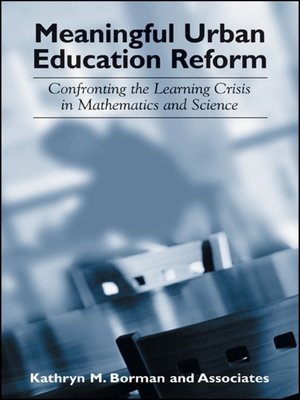Meaningful Urban Education Reform
ebook ∣ Confronting the Learning Crisis in Mathematics and Science · SUNY series, Power, Social Identity, and Education
By Kathryn M. Borman

Sign up to save your library
With an OverDrive account, you can save your favorite libraries for at-a-glance information about availability. Find out more about OverDrive accounts.
Find this title in Libby, the library reading app by OverDrive.



Search for a digital library with this title
Title found at these libraries:
| Library Name | Distance |
|---|---|
| Loading... |
Based on a three-year study of the National Science Foundation's Urban Systemic Initiative, Meaningful Urban Education Reform is an overview of recent attempts to change teaching in mathematics and science in urban environments. The book evaluates the impact of educational reform on urban schools, determines how schools with the highest levels of poverty in the United States can make successful changes, and investigates how communities and policy makers contribute to student achievement.
Contributors provide compelling portraits of classrooms, teachers, and students in elementary, middle, and high schools through case studies and examples from intensive research in four locations: Chicago, El Paso, Memphis, and Miami. They interviewed, observed, and gathered information from district administrators, school principals, teachers, students and their parents, and community members. The book provides valuable insight into how systemic reform works, offers suggestions regarding assessment of successful learning environments, and addresses the need for intensive, long-term professional development for the purpose of engaging teachers with their colleagues in communities of practice supported by a strong school culture.
Contributors provide compelling portraits of classrooms, teachers, and students in elementary, middle, and high schools through case studies and examples from intensive research in four locations: Chicago, El Paso, Memphis, and Miami. They interviewed, observed, and gathered information from district administrators, school principals, teachers, students and their parents, and community members. The book provides valuable insight into how systemic reform works, offers suggestions regarding assessment of successful learning environments, and addresses the need for intensive, long-term professional development for the purpose of engaging teachers with their colleagues in communities of practice supported by a strong school culture.







